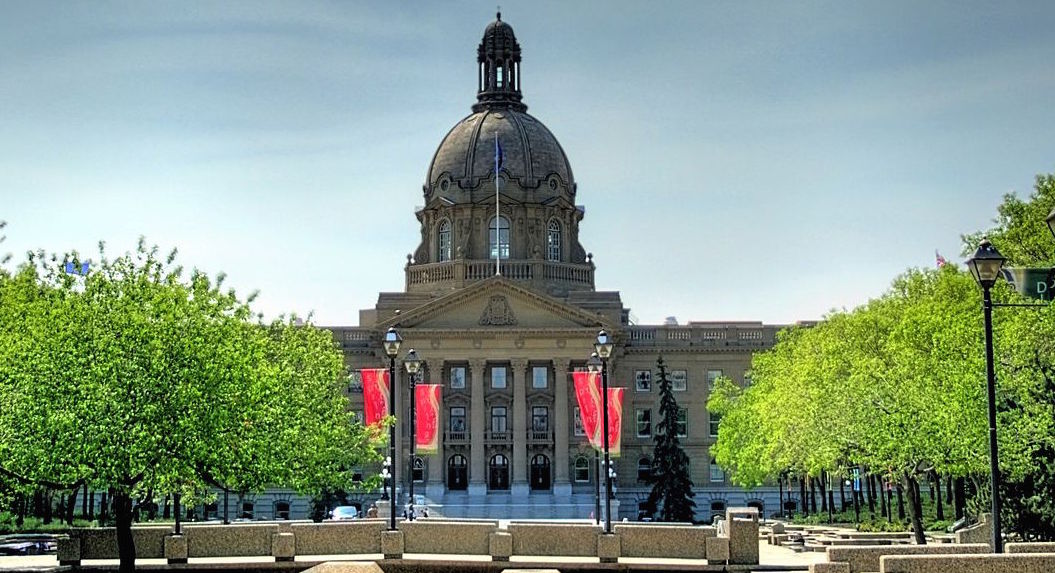Meanwhile, back on the farm, a new template for government of Alberta news releases is a-birthin’.
Henceforth and forevermore, presumably, all news releases issued by Alberta’s New Government ™ — a phrase that hasn’t appeared yet, but likely soon will, I reckon — will have to include the following points:
1. The federal government must do something
2. You can count on the Alberta Government to stand up for Alberta
3. While you’re counting on it, it will not sit idly by …
This observation was prompted by the statement last week by Alberta Agriculture Minister Devin Dreeshen in response to the announcement by the Chinese government it has suspended permits required by two Canadian pork exporting companies that ship meat to the People’s Republic.
The companies in question are based in Quebec, but one of the plants affected is in Red Deer, which explains the interest of the minister. It is not clear just yet whether the action resulted from incorrect labelling on some permits, as federal officials suggest, or official Chinese unhappiness over the arrest in Vancouver last year of Huawei Technologies executive Meng Wanzhou at the request of U.S. officials.
Meng remains in Vancouver while a Canadian court tries to determine if the rule of law still prevails south of the 49th parallel. This is not completely clear at this moment, particularly in light of the suggestion by Dreehsen’s favourite American politician that the arrest request was really just a negotiating tactic to get a U.S.-China trade agreement that suits his Republican administration.
Regardless, Dreeshen chose to believe the second explanation, presumably because it is the harder one for the Liberal government in Ottawa to resolve. “The federal government must find a resolution to these diplomatic disputes and restore access to our agricultural export markets,” he said, offering no hints on how they might achieve that goal without infuriating the colossus to the south.
He noted that Alberta is standing with its farmers, for whom market access is a critical issue, and that they can count on the Alberta government to stand up for Alberta, which demonstrates the minister is a stand-up guy, I guess, even if that extra Alberta sounds faintly redundant. (Note: Everyone thinks they’re an editor – Ed.)
Markets are a sore point in rural Alberta nowadays not just because of that pipeline thing, but because the Chinese government has also blocked exports from two of Canada’s largest canola seed-exporting corporations, saying Canadian canola seed is infested with pests.
According to the CBC’s report yesterday, Canadian politicians insist that just isn’t true.
The reality, though, is that whatever is going on at the Red Deer pork plant and in Vancouver, the Chinese have long had legitimate concerns about Canadian canola seed — to wit, dirt, straw, seed pods and other junk, some of it infected with fungus that the Chinese want limited to 1 per cent, which finds its way into Canadian canola seeds bound for export.
This is a problem that seems to have its roots in the free-market fanaticism of the former Harper Conservative government in which Dreeshen’s boss, United Conservative Party Premier Jason Kenney, held important cabinet posts. It has continued, though, under the softer, gentler neoliberal regime of the Trudeau government.
Getting back to the Red Deer swine swivet, Dreeshen concluded: “We will not sit idly by while these disruptions continue to impact Alberta producers.”
It is not clear what the Alberta government can do while it’s not sitting idly by — other than standing up, perhaps — but that is not really the point of this kind of this kind of rhetoric, of which we can expect to hear a lot more.
The strategy in a nutshell: blame Ottawa; say you’re doing something; if the problem gets fixed, take credit; if not, assign blame again.
For his part, Premier Kenney put out a long statement of his own, complaining about federal Bill C-69, which changes how major infrastructure programs are reviewed and approved in Canada. (If it was a Kenney government bill, of course, it would be called Bill C-89.)
The provincial government was less voluble, though, on the topic of Trident Energy Co., the Calgary energy corporation that closed shop on Tuesday, ignoring an order to properly manage its 4,700 wells and walking away from obligations of more than $300 million for cleanup and reclamation.
It’s not at all clear how a government so committed to cutting “red tape” it’s created a new bureaucracy to do that is going to ensure Alberta taxpayers don’t end up having to pay to clean up after Alberta’s fossil fuel industry, which some estimates say could cost as much as $260 billion.
Don’t expect a press release on that topic just now.
David Climenhaga, author of the Alberta Diary blog, is a journalist, author, journalism teacher, poet and trade union communicator who has worked in senior writing and editing positions with The Globe and Mail and the Calgary Herald. This post also appears on David Climenhaga’s blog, AlbertaPolitics.ca.
Photo: WinterE229 (WinterforceMedia)/Wikimedia Commons
Help make rabble sustainable. Please consider supporting our work with a monthly donation. Support rabble.ca today for as little as $1 per month!



